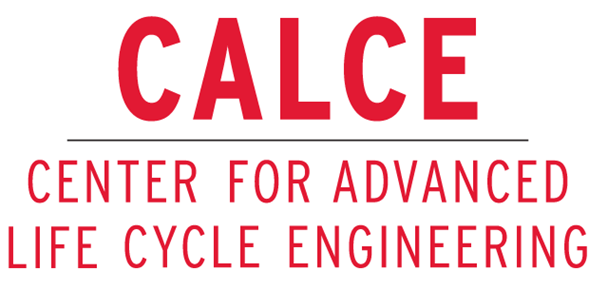The Center for Advanced Life Cycle Engineering (CALCE) is recognized as a founder and driving force behind the development and implementation of physics-of-failure (PoF) approaches to reliability, as well as a world leader in accelerated testing, electronic parts selection and management, and supply-chain management. CALCE is at the forefront of international standards development for critical electronic systems, having chaired the development of several reliability and part selection standards. CALCE is staffed by over 100 faculty, staff, and students. Collectively, CALCE researchers have authored over 35 internationally acclaimed textbooks and well over 1000 research publications relevant to electronics reliability.
 In 1986, CALCE became a National Science Foundation Center of Excellence in Systems Reliability and is now an internationally recognized leader in reliability assessment of electronics based on physics of failure analysis and prognostics and health management. CALCE has grown into a consortium that receives millions of dollars of funding in research support and employs more than 100 faculty, research staff, and graduate students from most engineering disciplines. With the advent of newer, smaller, and greener technologies, CALCE has worked to help many companies migrate to new practices, which included transitions to plastic-encapsulated electronics, surface mount technology, lead-free electronics, and the utilization of commercial consensus-based on industry standards. But in today’s fast-paced electronics industry, time-to-market is paramount and the use of reliability modeling and virtual qualification can significantly shorten the time between design iterations. If a manufacturer’s product fails in the initial production phase or if that manufacturer ships a bad product with inherent design flaws, expenses increase drastically and the potential loss of customers can be extremely damaging. The ramifications of getting things wrong can be detrimental to a company.
In 1986, CALCE became a National Science Foundation Center of Excellence in Systems Reliability and is now an internationally recognized leader in reliability assessment of electronics based on physics of failure analysis and prognostics and health management. CALCE has grown into a consortium that receives millions of dollars of funding in research support and employs more than 100 faculty, research staff, and graduate students from most engineering disciplines. With the advent of newer, smaller, and greener technologies, CALCE has worked to help many companies migrate to new practices, which included transitions to plastic-encapsulated electronics, surface mount technology, lead-free electronics, and the utilization of commercial consensus-based on industry standards. But in today’s fast-paced electronics industry, time-to-market is paramount and the use of reliability modeling and virtual qualification can significantly shorten the time between design iterations. If a manufacturer’s product fails in the initial production phase or if that manufacturer ships a bad product with inherent design flaws, expenses increase drastically and the potential loss of customers can be extremely damaging. The ramifications of getting things wrong can be detrimental to a company.
Helping design engineers “get it right” in the early stages of product development is a tenet of CALCE's mission. To accomplish this, CALCE provides research and evidence to design for reliability. CALCE's software and methodology have helped save millions of dollars for military and commercial programs by qualifying new technologies, demonstrating the reliability of new hardware, and troubleshooting existing warranty returns and field failures. Moreover, as new materials and processes are introduced into components and substrates, their impact on the product life cycle is being addressed at CALCE through testing and modeling using the principles of reliability science.
Top
